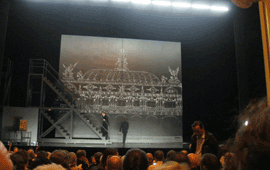> [Archived] Chronicles

Paris (II)
The overwhelmingly successful performance series of Alcèste has come to an end on the stage of the Paris Opera. I had the opportunity to be in the audience on the evening of Friday, 4th October, 2013, and I watched the masterpiece, premiered in Vienna in 1767, through which Gluck accomplished the first great reform of the lyrical genre, characterized by his devotion to expression and emotion, by having a perfectly justified connection between words and sounds, by the eradication of excessive embellishment and stunning, yet purely demonstrative vocal acrobatics, by the increase of the role of the orchestra in the economy of the musical piece … In the orchestra pit (and in the second act, on stage), there sat the famous Musiciens du Louvre from Grenoble, conducted by Mark Minkowski. They were joined by the members of the choir bearing the same name, Musiciens du Louvre. Only at Bayreuth did I feel the concert hall so full, so vibrant, so involved... I occasionally had the impression of choking under the pressure of waiting imposed by hundreds of curious eyes and greedy ears! My expectations were truly fulfilled and I experienced a Gluck performance overflowing with emotion and expressivity in Gluck's native land (the revised version of the score with the libretto translated into French, which survived the passing of time, was performed in 1776 in Paris). On stage, Sophie Koch (Alcèste) and Yann Beuron (Admète) had to face extreme life and death situations. Out of love, the wife decides to meet death in order to spare her husband. Out of an equally deep love, the husband decides to follow his wife, without whom he cannot live anymore. Deeply moved, the gods decide to make the supreme gesture and they return the two lovers to the world of the living. At the end of the performance the ovations and applause stopped with difficulty.
The choices of the stage director Olivier Py and the costume and décor creator Vierre André Weitz were truly surprising: on stage sat only an immense blackboard, conceived as a giant puzzle, on whose components five artists tirelessly drew and erased complicated images portraying wonderful castles, dark forests, angry waters, gigantic staircases, spectres, skulls... In the end the blackboard is dirty, black, empty... and standing in front of it, immersed in the white spotlights, the two protagonists, living proof that everything in this lifetime is passing except for true love, which is eternal. An original and inspired concept in which Gluck's music harmonized remarkably well . Unfortunately, I cannot say the same thing about Lucia di Lammermoor by Donizetti on the stage of the Bastille Opera House.
... to Andrei Șerban's Lucia
It is not a new performance, perhaps only slightly embellished. The concept is still the same - Lucia di Lammermoor, Donizetti's masterpiece, is set, according to Andrei Șerban, in the dark, closed confines of a barrack, while the first two acts are set in an admirably well-equipped gym. Here the soldiers train, together with the commander himself, Enrico Ashton (George Petean); here miserable Lucia (Patrizia Ciofi) sings her joys and sorrows in a veritable and... pointless tour de force interpretation , which entails her "playing" with the gym equipment, the trellises, the rings, the vaulting horse, some unstable benches, an improvised swing which floats above the orchestra... The audience applauded vigorously the soprano, who, while observing all the stage director's indications, was able to keep her voice pure in a fantastic demonstration of authentic bel-canto. Unbelievable, yet true! From his first steps, the tenor Vittorio Grigolo imposed an impetuous Edgardo, an extremely romantic character, highly agitated, both vocally and scenically, especially in the second act as he appeared in the gym (where Lucia's wedding to Arturo takes place) with a bare chest, his sword in his hand, fiercely fighting with his own despair and displaying the rage of a man against the world. Of course, the performer's ardour, in terms of both the melody and the acting, was rewarded with applause which seemed to start almost on command. As a polar opposite, George Petean exhibited a reserved stage presence and a vocal evolution remarkable through its beautiful, personal timbre. I must also mention that there was another Romanian singer on the Parisian stage, Cornelia Onicioiu, whose performance as Alisa was entirely satisfying.
The orchestra and the choir of the Paris Opera were truly exceptional. Conducting the performance was the maestro Maurizio Benini, whom lovers of the lyrical genre know and love for his performances at the MET over the last years. Out of these, The Elixir of Love by Donizetti and Le Comte Ory by Rossini were available to watch in Bucharest during live transmissions within The MET Live in HD international project.
Translated by Diana-Crezante Raicev and Elena Daniela Radu
MTTLC, The University of Bucharest














